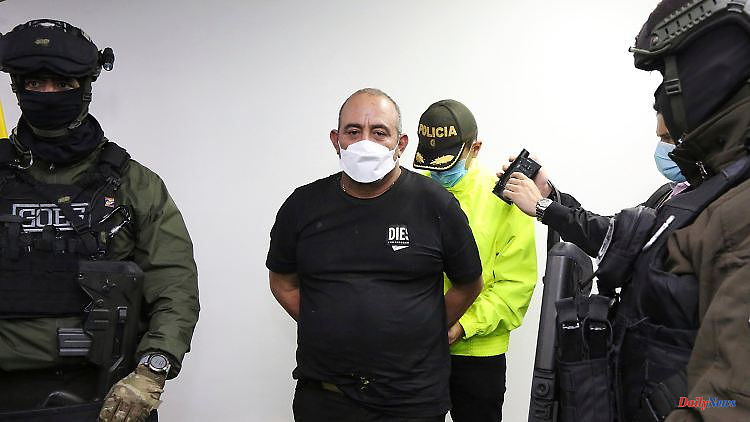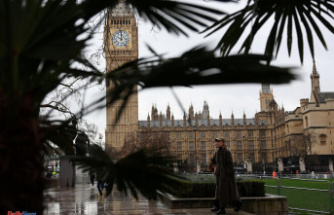He was the most powerful narco in Colombia since Pablo Escobar's death. Now Dairo "Otoniel" Úsuga has pleaded guilty. But Gustavo Petro, the country's first left-wing president, has far more in mind.
A new era has begun in Colombia. Colombia's biggest drug lord to date, Dairo Úsuga aka Otoniel, is no longer active. Otoniel had been on the run for years, in hiding, but held the reins of his "Clan del Golfo" cartel. Competitors also referred to him as an "animal" because of his brutality. He traveled with family members through a mountainous region in northern Colombia and escaped large-scale searches. But in October 2021 he was arrested and then extradited to the USA. Now he has pleaded guilty.
The problems with armed groups like the Clan del Golfo - named for their origins in the Gulf of Urabá on the Panamanian border - go far beyond that. Such bacrim ("bandas criminales") may be involved in illegal businesses such as drug production and smuggling, logging and panning for gold. In addition to guerrilla groups, they control extensive rural areas in Colombia. According to the Colombian human rights organization Indepaz, more than 70,000 people were displaced last year. At the same time, 92 so-called massacres were committed, with a total of 346 fatalities. 179 social leaders were also killed. Main responsible are Bacrim.
Gustavo Petro, the first left-wing president in Colombia's history, is currently trying to advance an enormous project: "total peace". It stands in contrast to the policy of the militarily heavy hand, which Colombia also pursued with US money for decades. Even a partial success of this new willingness to engage in dialogue would be historic in a civil war country. Otoniel's cartel has agreed to negotiate with the government over disarmament - if several captured leaders are allowed to sit at the table. It is not known whether this also necessarily includes Otoniel.
Otoniel was the latest in a series of major drug lords in Colombia, such as Loco Barrera and Don Berna; but of all the most powerful and influential than the popular Pablo Escobar. For Colombia, the end of the cartel boss may mark a turning point. Since his arrest, some cells of the clan have acted independently and forged new alliances. The clan is said to have around 4,000 members and be present in more than 200 Colombian communities. Otoniel's former right-hand man, Jesus Ávila aka Chiquito Malo (Bad Boy), may only control the core of the territory around the Gulf of Urabá.
During the decades of armed conflict, Colombia's security forces repeatedly arrested the heads of Bacrim, after which others followed suit. Just like Chiquito Malo with the clan. However, one of the main reasons for the power of the armed groups is the lack of state presence. Petro wants to change that too. In recent months, he has conducted dozens of citizen dialogues across the country to learn more about the needs of residents.
Petro's predecessor Iván Duque had said about the narco that he would extradite the "sewer rat" Otoniel to the USA. In May 2022, the US anti-narcotics agency DEA personally flew Otoniel to the United States despite all legal resistance. Since then, the head of the clan has been on trial in a New York state court for flooding the United States with illegal substances with his huge international network.
Otoniel has now negotiated a deal: He admits to having smuggled 96.8 tons of cocaine into the United States, wants to sell $ 216 million worth of belongings and faces about 20 years in prison. "The bloody reign of the most brutal and important drug smuggler since Pablo Escobar is over," prosecutor Breon Peace said in a January 25 press release.
Petro's "total peace" is probably the most ambitious initiative in the history of the armed conflict in Colombia. The government wants to negotiate contracts with as many armed groups as possible at the same time. This is also historic because the Congress has so far not opposed it. Politicians have had ties to paramilitary groups in the past and made money from the conflict. Of the more than 30 major groups, at least 23 can envisage making a conditional commitment to peace. You have held initial talks with the government. A ceasefire has already been agreed with some.
The most important groups also include several renegade FARC-EP units, some of which have formed new alliances. Not all of them still have political goals. The communist FARC was once the largest guerrilla group in Colombia, and their declared goal was improved living conditions for the rural population. At its peak in 2002, it controlled about a third of the land area with 20,000 fighters.
Six years ago, the Colombian government under President Juan Manuel Santos signed the historic peace treaties with the FARC. About 7,000 fighters laid down their arms and took part in integration programs. Some organized themselves into a political party. Some units refused. The Colombian state failed to deliver on many promises made about rural infrastructure programs. The best-known dissident unit is the "Second Marquetalia" under Iván Márquez, who led the FARC peace negotiations. He returned to the armed struggle in 2019. Time and time again, former guerrilla fighters are killed in revenge for laying down their weapons.
Concrete peace negotiations are taking place between Petro's government and the other important guerrillas, the National Liberation Army (ELN - Ejército de Liberación Nacional). That doesn't have to mean anything, such talks have failed several times after new outbreaks of violence. If they are brought to a conclusion, however, it would be a tremendous success and, on paper at least, the days of the left-wing guerrillas in Colombia are over. The ELN has around 3,000 fighters, some of whom are active on Venezuelan territory like renegade FARC units.
In contrast to the guerrillas, the Bacrim usually have no political goals. Last year, the United Nations registered a new historic record in cocaine production in Colombia. Due to a lack of infrastructure and income opportunities, farmers who grow coca plants often have few attractive alternatives. Also, cocaine is big business for armed groups. And if the current ones no longer want to operate it, there may be others who will step into the breach. Just like after the government's peace treaty with the FARC.












